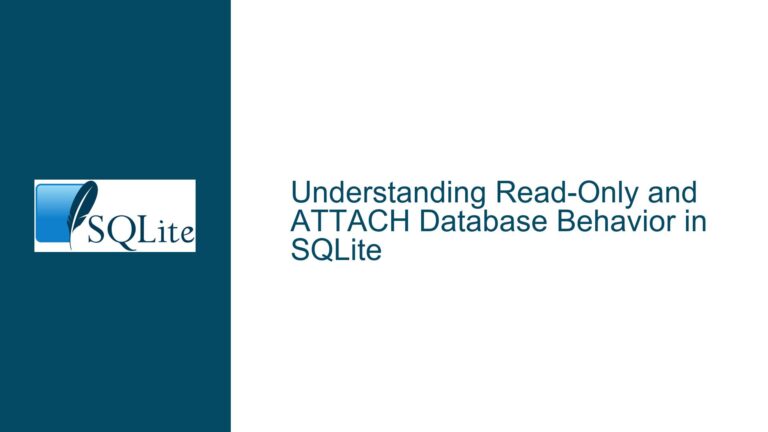Resolving Foreign Key Mismatch in SQLite When Deleting Records
Understanding Foreign Key Constraint Violations During Deletion
Schema Design Flaws Leading to Referential Integrity Failures
The core issue arises from attempting to delete a record in the ProgramList table while a foreign key constraint exists in the Programs table that references it. SQLite enforces referential integrity through foreign key constraints, requiring that every foreign key value in the child table must match a primary key value in the parent table. The error message explicitly indicates a mismatch between the Programs and ProgramsList tables, revealing fundamental flaws in the database schema design.
Key Problem Components:
Data Type Incompatibility
ThePrograms.UserNamecolumn was initially defined as TEXT while referencingUser.ID(INTEGER), creating a type mismatch that violates SQLite’s foreign key requirements. Though later corrected, this highlights the critical need for consistent data typing across related columns.Non-Unique Parent Key Reference
ThePrograms.Programforeign key referencesProgramList.Programwithout a UNIQUE constraint on the parent column. SQLite mandates that foreign keys must reference either PRIMARY KEY columns or columns with explicit UNIQUE constraints to ensure unambiguous relationships.Composite Key Ambiguity
The original table structure contained implicit composite keys through multiple column references without proper index support, creating confusion in constraint enforcement. The foreign key declaration inProgramsattempted to reference a non-unique column (ProgramList.Program) rather than the intended primary key (ProgNumber).
Structural Analysis of Flawed Relationships
Table Schema Breakdown
- User Table
CREATE TABLE User (
ID INTEGER PRIMARY KEY AUTOINCREMENT,
UserName TEXT,
MashineID TEXT
)
- Primary Key:
ID(INTEGER) - Missing unique constraint on
UserName+MashineIDcombination
- ProgramList Table
CREATE TABLE ProgramList (
ProgNumber INTEGER PRIMARY KEY AUTOINCREMENT,
Program TEXT
)
- Primary Key:
ProgNumber(INTEGER) - Critical missing UNIQUE constraint on
Programcolumn
- Programs Table
CREATE TABLE Programs (
ProgID INTEGER PRIMARY KEY AUTOINCREMENT,
UserName TEXT REFERENCES User(ID),
Program TEXT REFERENCES ProgramList(Program),
FilePath TEXT,
Installed BOOLEAN
)
- Foreign Key Issues:
UserNameTEXT referencing INTEGERUser.ID(type mismatch)ProgramTEXT referencing non-uniqueProgramList.Program- No index on foreign key columns
Constraint Enforcement Mechanics
SQLite verifies foreign key relationships through the following checks:
- Parent table existence verification
- Column count and order matching in composite keys
- Data type compatibility
- Parent key uniqueness enforcement
- Index availability for efficient constraint checking
The schema fails multiple checks due to:
- TEXT-to-INTEGER type mismatch in
UserNamereference - Non-unique parent key in
ProgramList.Program - Missing indexes on foreign key columns
Comprehensive Resolution Strategy
1. Schema Restructuring
-- User Table with Natural Key
CREATE TABLE User (
ID INTEGER PRIMARY KEY AUTOINCREMENT,
UserName TEXT NOT NULL,
MashineID TEXT NOT NULL,
UNIQUE(UserName, MashineID)
);
-- Program Catalog Table
CREATE TABLE ProgramList (
ProgNumber INTEGER PRIMARY KEY AUTOINCREMENT,
Program TEXT NOT NULL UNIQUE
);
-- Installation Records Table
CREATE TABLE Programs (
ProgID INTEGER PRIMARY KEY AUTOINCREMENT,
UserID INTEGER NOT NULL,
ProgNumber INTEGER NOT NULL,
FilePath TEXT,
Installed BOOLEAN DEFAULT 0,
FOREIGN KEY(UserID) REFERENCES User(ID)
ON DELETE CASCADE
ON UPDATE CASCADE,
FOREIGN KEY(ProgNumber) REFERENCES ProgramList(ProgNumber)
ON DELETE RESTRICT
ON UPDATE CASCADE
);
-- Index Creation
CREATE INDEX idx_programs_user ON Programs(UserID);
CREATE INDEX idx_programs_prog ON Programs(ProgNumber);
2. Foreign Key Configuration
- ON DELETE CASCADE: Automatically removes child records when parent deleted
- ON UPDATE CASCADE: Propagates primary key changes to foreign keys
- ON DELETE RESTRICT: Prevents program deletion while installations exist
3. Data Type Harmonization
- Changed
UserNamereference toUserIDINTEGER - Reference
ProgramList.ProgNumberinstead ofProgram
4. Index Optimization
- Created B-tree indexes on foreign key columns
- Enables efficient constraint checking during deletions
Implementation Verification Steps
- Constraint Validation
PRAGMA foreign_key_check;
- Returns empty result when constraints are satisfied
- Deletion Test Case
-- Should fail due to ON DELETE RESTRICT
DELETE FROM ProgramList WHERE ProgNumber = 1;
-- Should succeed with cascaded deletion
DELETE FROM User WHERE ID = 1;
- Schema Inspection
SELECT sql FROM sqlite_schema
WHERE type='table' AND name IN ('User','ProgramList','Programs');
- Verify corrected foreign key definitions
- Performance Benchmarking
EXPLAIN QUERY PLAN
DELETE FROM ProgramList WHERE ProgNumber = 1;
- Confirm index usage in constraint checking
Advanced Configuration Options
Partial Indexes for Conditional Constraints
CREATE INDEX idx_active_installs ON Programs(ProgNumber)
WHERE Installed = 1;
Deferrable Constraints
PRAGMA defer_foreign_keys = ON;
- Allows temporary constraint violation during transactions
Recursive Deletion Handling
WITH RECURSIVE delete_tree AS (
SELECT ProgNumber FROM ProgramList WHERE ProgNumber = 1
UNION ALL
SELECT p.ProgNumber FROM Programs p
JOIN delete_tree d ON p.ProgNumber = d.ProgNumber
)
DELETE FROM Programs WHERE ProgNumber IN (SELECT ProgNumber FROM delete_tree);
DELETE FROM ProgramList WHERE ProgNumber = 1;
Preventative Maintenance Practices
- Schema Validation Script
def validate_foreign_keys(conn):
cursor = conn.execute("PRAGMA foreign_key_check")
errors = cursor.fetchall()
if errors:
print(f"Constraint violations: {len(errors)}")
for row in errors:
print(f"Table {row} has {row} violations")
else:
print("All foreign key constraints satisfied")
- Migration Automation
-- Versioned schema migration
PRAGMA user_version = 2;
BEGIN TRANSACTION;
ALTER TABLE Programs RENAME TO Programs_old;
-- Create new table with corrected schema
COMMIT;
- Constraint Documentation Standard
COMMENT ON TABLE Programs IS 'Records software installations with User→Program relationships enforced through foreign keys';
This comprehensive approach addresses both the immediate foreign key mismatch error and establishes robust database design practices to prevent similar issues. By implementing type consistency, proper unique constraints, cascading actions, and strategic indexing, developers ensure reliable referential integrity while maintaining optimal performance for deletion operations.






